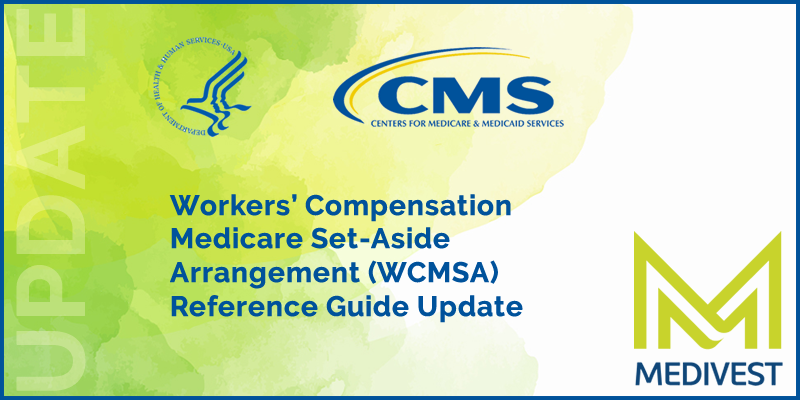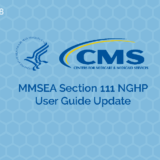WCMSA Reference Guide Version 3.5 Updates of Significance

The Centers for Medicare & Medicaid Services (CMS) released a revised Workers’ Compensation Medicare Set-Aside Arrangement (WCMSA) Reference Guide (“Reference Guide”) Version 3.5 on January 10, 2022. This Reference Guide replaces Version 3.4 which was released on October 4, 2021. When comparing the two Reference Guides, a new section 4.3 and new language has been added. Below indicates the new section and language added in the (WCMSA) Reference Guide Version 3.5.
To download the new WCMSA Reference Guide v3.5 Click Here.
CMS’s Version 3.5 Reference Guide, Section 1.1 includes the following changes:
Clarification has been provided regarding the use of non-CMS-approved products to address future medical care (Section 4.3).
Section 4.3 The Use of Non-CMS-Approved Products to Address Future Medical Care
A number of industry products exist with the intent of indemnifying insurance carriers and CMS beneficiaries against future recovery for conditional payments made by CMS for settled injuries. Although not inclusive of all products covered under this section, these products are most commonly termed “evidence-based” or “non-submit.” 42 C.F.R. 411.46 specifically allows CMS to deny payment for treatment of work-related conditions if a settlement does not adequately protect the Medicare program’s interest. Unless a proposed amount is submitted, reviewed, and approved using the process described in this reference guide prior to settlement, CMS cannot be certain that the Medicare program’s interests are adequately protected. As such, CMS treats the use of non-CMS-approved products as a potential attempt to shift financial burden by improperly giving reasonable recognition to both medical expenses and income replacement.
As a matter of policy and practice, CMS will deny payment for medical services related to the WC injuries or illness requiring attestation of appropriate exhaustion equal to the total settlement less procurement costs before CMS will resume primary payment obligation for settled injuries or illnesses. This will result in the claimant needing to demonstrate complete exhaustion of the net settlement amount, rather than a CMS-approved WCMSA amount.
Keep in mind the WCMSA Reference Guide states:
There are no statutory or regulatory provisions requiring that you submit a WCMSA amount proposal to CMS for review. If you choose to use CMS’ WCMSA review process, the Agency requests that you comply with CMS’ established policies and procedures.
Take Aways
- While CMS added Section 4.3, this language is not entirely new or at least not entirely unexpected. Similar currently existing Reference Guide language has for years included warnings about what could happen if parties failed to adequately consider Medicare’s future interests in WC settlements. For example, language from previous Reference Guide versions indicated in Section 8.0 that even for examples where a settlement did not meet CMS workload review thresholds “The settling parties must consider CMS’ future interests even though the case would not be eligible for review. Failure to do so could leave settling parties subject to future recoveries for payments related to the injury up to the total value of the settlement” (Example 1) and “Not establishing some plan for future care places the settling parties at risk for recovery from care related to the WC injury up to the full value of the settlement” (Example 2).
- Also in prior versions of the Reference Guide in Section 4.1.4, CMS has warned of its ability and intention to deny injury-related medical services when it said that “If Medicare’s interests were not reasonably considered, Medicare will refuse to pay for services related to the WC injury (and otherwise reimbursable by Medicare) until such expenses have exhausted the entire dollar amount of the entire WC settlement. Medicare may also assert a recovery claim, if appropriate.”
- On a positive note, CMS has now clarified in the new language in Section 4.3 that it will allow for a procurement cost reduction when there is a denial of service when there was no approved WCMSA submission. The new language clearly explains that the denial of service amount will not exceed the gross settlement minus procurement costs. This is more reasonable than denying services up to the entire amount of the settlement as it had previously listed or perhaps denying services up to double the amount of services. The double damages concept has been sometimes misstated in industry circles. (In court cases, even double damages claims have first determined the recovery damages by determining the conditional payment amount after applying a procurement cost reduction and then doubling that amount). The new language actually helps with this issue.
- However, perhaps even more troubling is whether funds earmarked to help protect Medicare’s future interests as WCMSA funds are actually used for the intended purpose. According to the National Council on Compensation Insurance, Inc. (NCCI) 2018 research brief updating its 2014 survey on WCMSAs, approximately ninety-eight percent (98%) of the Workers’ Compensation cases settled with the injured worker choosing to self-administer their MSA funds. This 2018 NCCI update published research brief included a sample of over 11,500 WC settlements between 2010 and 2015.
- Perhaps to address this gap between what is said will be done (i.e. WCMSA allocation reports) and what actually is done (the administration of settlement dollars to pay for injury-related medical items, services, and expenses including prescription drug expenses, CMS already has the following language recommending professional administration in its Reference Guide in Section 17:
“CMS highly recommends professional administration where a claimant is taking controlled substances that CMS determines are “frequently abused drugs” according to CMS’ Part D Drug Utilization Review (DUR) policy. That policy and supporting information are available on the web at https://cms.gov/Medicare/Prescription-Drug- Coverage/PrescriptionDrugCovContra/RxUtilization.html.
Claimants may also administer their own WCMSAs, if State law allows. Claimants should submit annual self-attestations, just as a professional administrator would. This arrangement is subject to the same rules and reporting requirements as any other WCMSA. See Section 17.5 for more on this annual attestation. Although beneficiaries may act as their own administrators, it is highly recommended that settlement recipients consider the use of a professional administrator for their funds.”
- Perhaps CMS felt that its existing high recommendation language for professional administration was sufficient to encourage settling parties to avoid pitfalls of incompetent administration of WCMSAs. But has CMS or any other entity ever done research to see what percentage of self-administered MSA funds were properly and fully exhausted before any injury-related medical bills were submitted to Medicare? If a non-submit WCMSA comes in at 80% of the CMS methodology submitted and approved WCMSA (80% because it follows an evidence-based drug tapering program guideline often seen in a state-based Workers’ Compensation medical protocol like the MTUS in California for example) but the WCMSA funds are professionally administered, wouldn’t that seem to protect Medicare’s real-world interests rather than a CMS submitted and approved WCMSA allocation report but self-administered by an injured claimant?
Stay Up To Date
Count on Medivest to help you navigate your risk tolerance in light of the new CMS WCMSA Reference Guide language and see if we can’t find the right balance to reasonably protect Medicare’s interests in your settlement. Medivest will continue to monitor changes occurring at CMS and will keep its readers up to date when such changes are announced. For questions regarding these updates, please reach out to a Medivest representative in your area by clicking here or call us direct at 877.725.2467.






